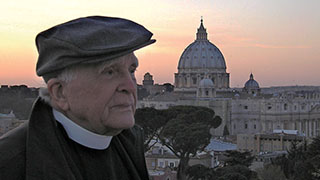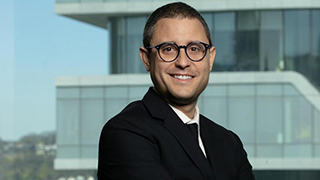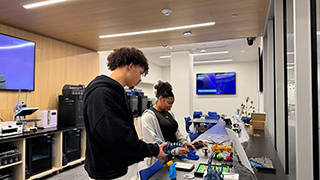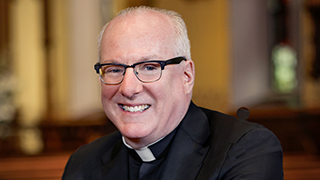Professor Named One of Five Catholic Scientists that 'Shaped our Understanding of the World' - Seton Hall University
Friday, June 1, 2018

Photo credit: Magdalen Rose
Father Stanley L. Jaki, O.S.B. was featured in Aleteia as one of five Catholic scientists that "Shaped our Understanding of the World." The other four are Copernicus, Father Gregor Mendel, Father Giuseppe Mercalli and Father Georges Lemaitre, responsible, respectively, for: our understanding that the sun is at the center of the universe; the experiments with pea plants that led to the discovery of hereditary trait patterns — the foundation of modern genetics; a seismological scale that accounts for human impact; and the development of the Big Bang theory.
Father Jaki, who taught at Seton Hall from 1965 until his passing in 2009, achieved the rank of Distinguished Professor of Physics at the University and served as a visiting professor and lecturer at universities all over the world, including as Visiting Scholar for the Institute for Advanced Study at Princeton; Fremantle Lecturer at Balliol College, Oxford; Hoyt Fellow at Yale University; and the Farmington Institute Lecturer at Oxford University. Father Jaki also delivered the prestigious Gifford Lectures at the University of Edinburgh.
Described as a "a leading contributor to the philosophy of science and the history of science, particularly to their relationship to Christianity," Father Jaki was a Hungarian-born priest of the Benedictine order with doctorate degrees in both systematic theology and physics.
He authored more than 40 books during a span of forty years with more than half written on the relation between modern science and Christianity. According to The New York Times, "In later works Father Jaki explored the boundary between science and religion; he believed the two were compatible and mutually reinforcing."
Among other accomplishments, according to Wikipedia, Jaki was "among the first to claim that Gödel's incompleteness theorem is relevant for theories of everything (TOE) in theoretical physics. Gödel's theorem states that any theory that includes certain basic facts of number theory and is computably enumerable will be either incomplete or inconsistent. Since any 'theory of everything' must be consistent, it also must be incomplete."
From The Relevance of Physics, published in 1966 and considered Professor Jaki's first "important" book:
It is on the ultimate success of such a quest [for a TOE] that Gödel's theorem casts the shadow of judicious doubt. It seems on the strength of Gödel's theorem that the ultimate foundations of the bold symbolic constructions of mathematical physics will remain embedded forever in that deeper level of thinking characterized both by the wisdom and by the haziness of analogies and intuitions. For the speculative physicist this implies that there are limits to the precision of certainty, that even in the pure thinking of theoretical physics there is a boundary present, as in all other fields of speculations.
Aleteia, an online news site published in eight languages with 11 million unique monthly visitors, 3 million fans on Facebook and a newsletter subscriber base of nearly half a million, notes of Father Jaki:
His obituary in the New York Times describes him as a 'relentless scholar' who produced more than 40 books over the course of his career, including studies of G.K. Chesterton and Cardinal John Henry Newman.
Among his more notable works were The Relevance of Physics in 1966 and Science and Creation in 1974. In both works, Jaki "argued that the scientific enterprise did not become viable and self-sustaining until its incarnation in Christian medieval Europe, and that the advancement of science was indebted to the Christian understanding of creation," according to the Times. In a 1967 article in the Journal of Science and Religion, Jaki advanced his argument even further, stating that "faith, or belief, forms the ultimate foundation of the certainty of every knowledge."
Father Jaki was awarded the Templeton Prize in 1987 for "his immense contribution to bridging the gap between science and religion, and his making room, in the midst of the most advanced modern science, for deep and genuine faith." In 1990 he was appointed an honorary member of the Pontifical Academy of Sciences by Pope John Paul II. In 2009, Father Jaki presented his last lecture at the Casina of Pope Pius IV, headquarters of the Pontifical Academy of Sciences; after the lecture, on his way back home to the United States, he passed away in Madrid, Spain at the age of 84.
"As this article in Aleteia notes, Professor Jaki stands among the great scientific minds of this world," said Professor Nicholas Snow, Director of Research at Seton Hall. "Copernicus, Mendel, Lemaitre, Mercalli and Jaki. It's an exclusive list, and Seton Hall was home to that great mind for more than 40 years. He helped both shape our understanding of the world and build our University into the world-class research institution it has become. Great minds from all over the world came here and were touched by Father Jaki – and they in turn continue his legacy at Seton Hall."






